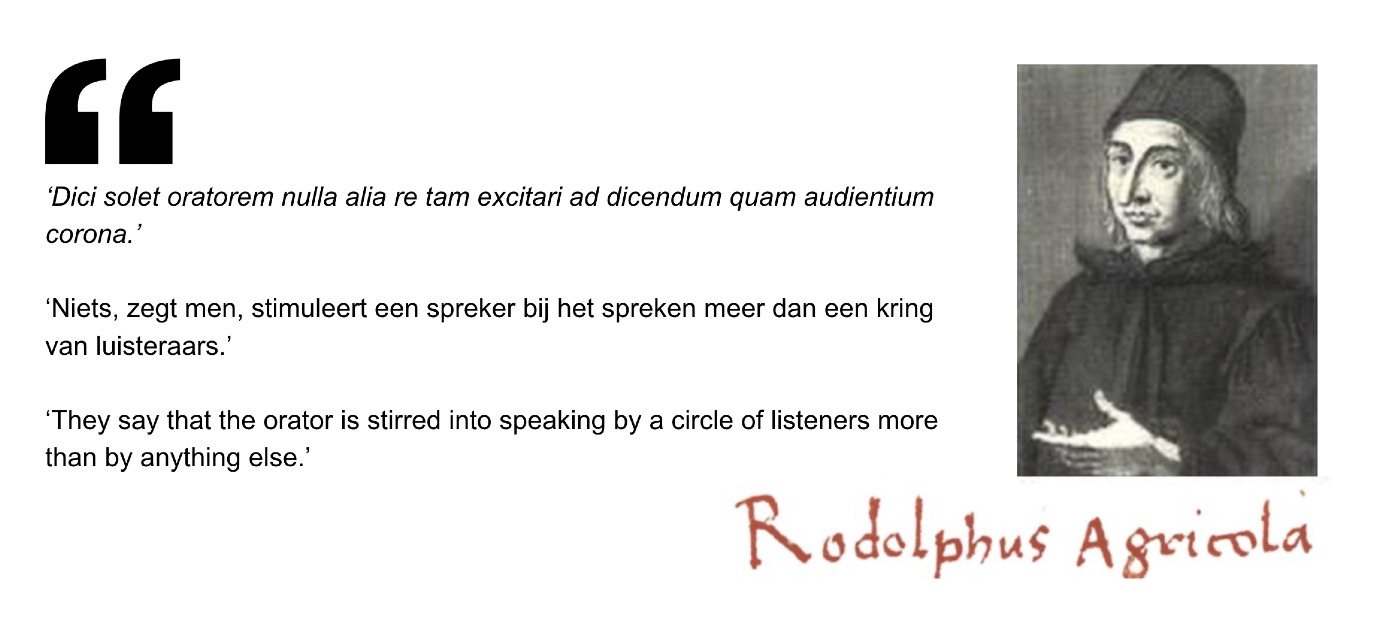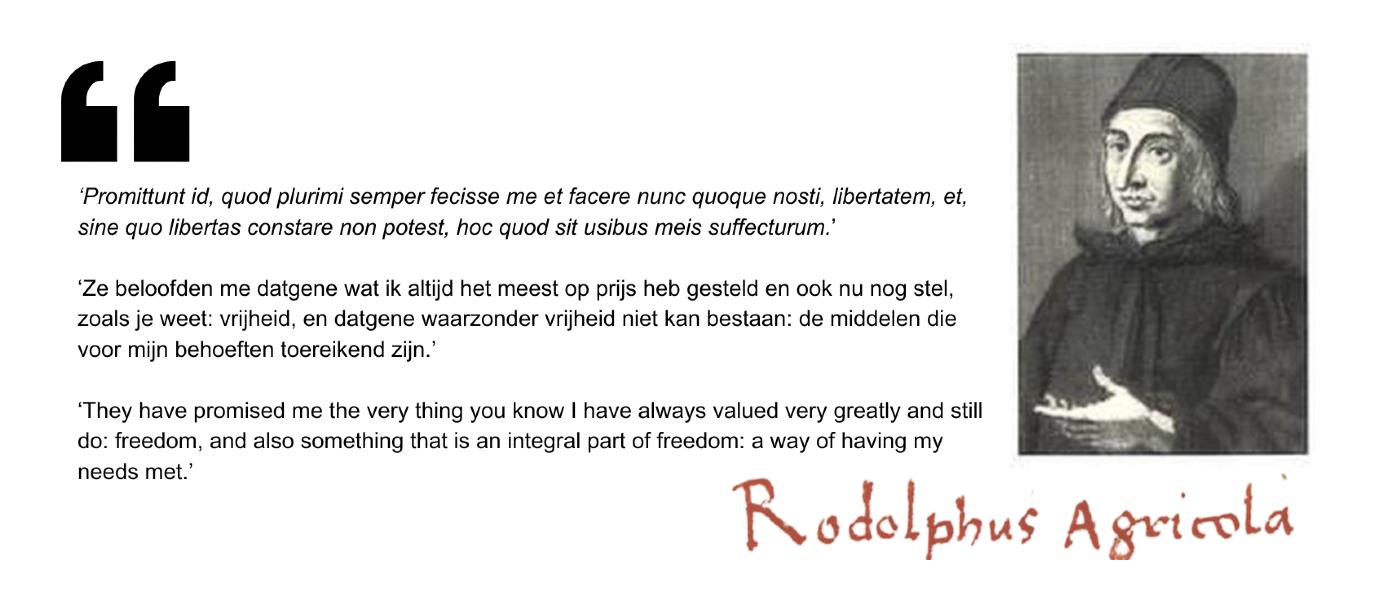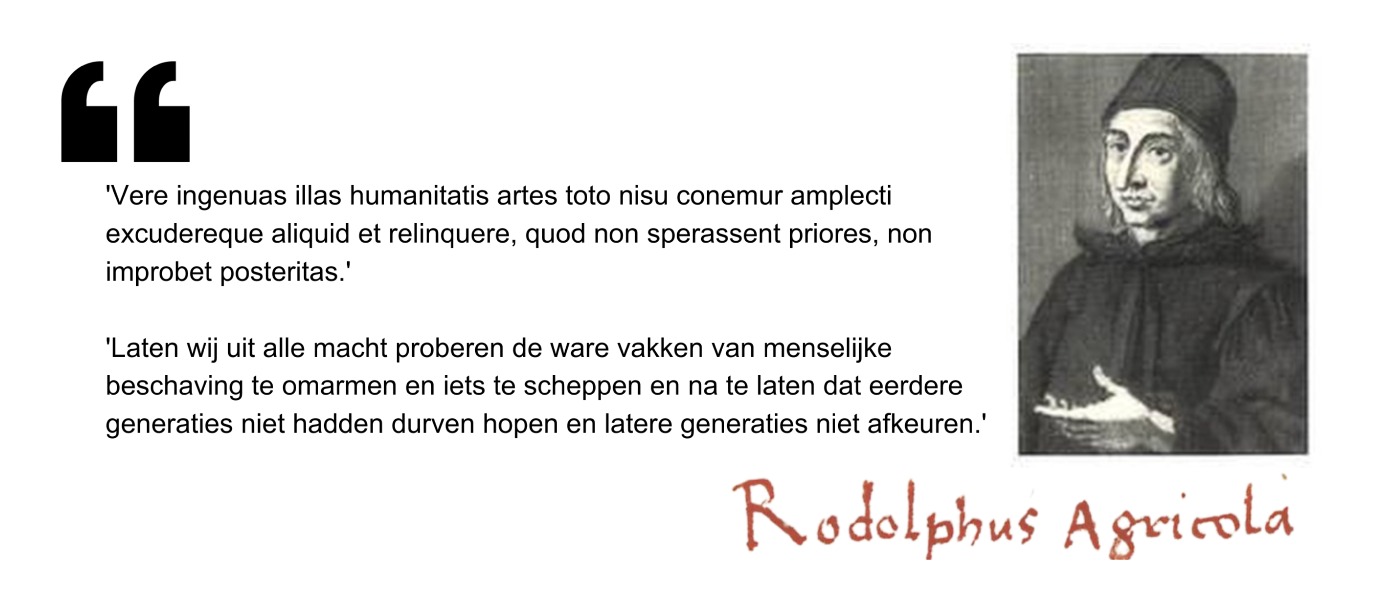Rudolf Agricola in zijn eigen woorden

|
'Dici solet oratorem nulla alia re tam excitari ad dicendum quam audientium corona.'
Rudolf Agricola in een brief van 15 augustus 1479
|
Toen Agricola deze brief schreef aan zijn studievriend Dietrich von Plieningen, had hij net zijn studie in Ferrara beëindigd en was hij onderweg terug naar Groningen. Onderweg verbleef hij een tijd in Dillingen aan de Donau in het kasteel van zijn vriend Johann von Werdenberg, bisschop van Augsburg. Hier voltooide hij zijn magnum opus, De inventione dialectica, dat hij opdroeg aan zijn vriend Dietrich door middel van deze opdrachtbrief. In de 16e eeuw werd Agricola's boek een invloedrijk leerboek over retorica, maar het zou nog zo'n 35 jaar duren en de actieve inzet van mensen als Erasmus van Rotterdam voordat het boek in 1515 voor het eerst werd gedrukt en een groot publiek bereikte.
Het citaat drukt een gemeenplaats uit, zoals Agricola ook zelf expliciet schrijft. Vergelijkbare citaten zijn al bij auteurs uit de Oudheid te vinden, zoals Cicero en Plinius de Jongere, en ook bij latere auteurs. Een mooie versie met paronomasie is van Johannes Reuchlin, de beroemde hebraïst en correspondent van Agricola: "disertus non sum disertus" (verlaten kan ik niet vlot spreken).
Conservator Bijzondere Collecties, UB Groningen

In 1482 was Agricola stadssecretaris van Groningen. Hij was vaak op reis namens de stad, maar ook om persoonlijke redenen. Zo bezocht hij twee oude vrienden uit zijn studietijd in Italië, die nu prominent verbonden waren aan het hof van de Paltsgraaf in Heidelberg. Zij probeerden hem te verleiden om zich permanent in Heidelberg te vestigen en zich daar als geleerde aan het hof en de universiteit verdienstelijk te maken.
Hierover schrijft Agricola op 11 oktober 1482 aan zijn boezemvriend Adolf Occo, die ook met hem in Italië had gestudeerd en nu als arts in Augsburg werkte.
Hij beschrijft het aanbod uit Heidelberg, waarvan dit citaat de kern is: het vooruitzicht om zonder enige verplichting als Privatgelehrter te kunnen leven. Na lang wikken en wegen heeft Agricola het aanbod aangenomen en zich in 1484 in Heidelberg gevestigd.
Conservator Bijzondere Collecties, UB Groningen

Sinds eind jaren 1460 studeerde Agricola in het Italiaanse Pavia, maar af en toe kwam hij terug naar Groningen om zijn familie en vrienden te zien. Hij verbleef dan in het klooster Selwerd, waarvan zijn vader abt was. Ook ging hij naar het rijke klooster Aduard, waar abt Hendrik van Rees regelmatig intellectuelen ontving die geïnspireerd werden door het humanisme, een nieuwe educatieve stroming die al in de 14e eeuw was opgebloeid in Italië en in de jaren 1460 zijn eerste aanhangers in de Nederlanden vond: in Frisia.
Vanuit Selwerd schreef Agricola deze woorden op 5 februari 1471 in een brief aan zijn geestverwant Antonius Liber, die in de stad Groningen werkte als leraar en koster van de Martinikerk.
De brieven van Agricola laten zien wat het humanisme volgens hem inhield en hoe hij het actief bepleitte. Kern van het humanisme waren de vijf vakken van beschaving waarnaar Agricola hier verwijst: grammatica (taal), retorica (communicatie), poëzie (schrijfvaardigheid), historiografie (gedrag in praktijk) en ethica (gedrag in theorie).
Alle brieven van Agricola zijn vrij recent vertaald in het Nederlands en in het Engels.
Vertaling en toelichting door dr. Adrie van der Laan, Conservator Bijzondere Collecties Universiteitsbibliotheek, Rijksuniversiteit Groningen
' Humanitate doctrinaque dari nullum potest maius.'
' Er is geen groter geschenk dan geestelijke en wetenschappelijke vorming.'
Rodolphus Agricola, 1476
In 1475 verliet Rudolf Agricola de universiteit van Pavia om te gaan studeren in Ferrara. Daar kon hij namelijk ook klassiek Grieks studeren, iets wat hij noodzakelijk achtte voor een grondige studie van de humaniora, waarvoor volgens Agricola (in navolging van het Italiaanse humanisme) de hele cultuur en literatuur van de Grieks-Romeinse Oudheid het fundament moest zijn.
Ook huurde hertog Ercole d'Este hem in als organist aan zijn hof, dat zich kenmerkte door grote culturele rijkdom. In de zomer van 1476 viel Agricola de eer te beurt om het nieuwe academische jaar te openen in aanwezigheid van de hertog. Geen geringe onderscheiding aan een universiteit die zich beroemde op vele geleerden van internationale faam. Bij deze gelegenheid hield Agricola een lofrede op de wetenschappen, waarin hij bovenstaande uitspraak doet.
Als humanist legde hij zich toe op de humaniora (the humanities), die voor hem de kern en het summum van menselijke beschaving vormden. Die beschaving (vorming) was in Agricola's ogen het hoogste doel en streven van onderwijs. Deze toespraak van Agricola is nog nooit in z'n geheel in het Nederlands vertaald, maar een gedeelte ervan heeft prof. dr. Marc van der Poel vertaald in zijn boek Rudolf Agricola Over dialectica en humanisme (Baarn: Ambo, 1991).
Naturalis philosophia ut nihil quod usquam gigneretur, relinqueret ignotum, penetravit aperuitque cuncta totamque rerum naturam non cognitioni solum, sed servituti quoque et usibus exhibuit humanis.
De wetenschap dringt alles binnen, legt alles bloot en brengt de hele natuur der dingen tevoorschijn, niet alleen voor kennis, maar ook om de mens te dienen en tot nut te zijn.Rodolphus Agricola, 1476
In 1475 verliet Rudolf Agricola de universiteit van Pavia om te gaan studeren in Ferrara. Daar kon hij namelijk ook klassiek Grieks studeren, iets wat hij noodzakelijk achtte voor een grondige studie van de humaniora, waarvoor volgens Agricola (in navolging van het Italiaanse humanisme) de hele cultuur en literatuur van de Grieks-Romeinse Oudheid het fundament moest zijn. Ook huurde hertog Ercole d'Este hem in als organist aan zijn hof, dat zich kenmerkte door grote culturele rijkdom.
In de zomer van 1476 viel Agricola de eer te beurt om het nieuwe academische jaar te openen in aanwezigheid van de hertog. Geen geringe onderscheiding aan een universiteit die zich beroemde op vele geleerden van internationale faam. Bij deze gelegenheid hield Agricola een lofrede op de wetenschappen, waarin hij ook bovenstaande uitspraak doet. Als geesteswetenschapper legde hij zich toe op de humaniora, maar hij zag en erkende de waarde van de wetenschappen in brede zin voor de optimale vorming van de mens, ook in deze oratie. Die optimale vorming was in zijn ogen het hoogste doel en streven van onderwijs en als overtuigd christen zag hij bovendien de mens als de bekroning van de schepping. In deze geloofsovertuiging werd hij nota bene gesterkt door de prestaties die de menselijke wetenschap wist te leveren.
Agricola's toespraak is nog nooit in z'n geheel in het Nederlands vertaald, maar een gedeelte ervan is vertaald door prof. dr. Marc van der Poel in zijn boek Rudolf Agricola Over dialectica en humanisme (Baarn: Ambo, 1991).
Dr. A.H. (Adrie) van der Laan, Conservator Bijzondere Collecties Universiteitsbibliotheek, Rijksuniversiteit Groningen
| Laatst gewijzigd: | 23 mei 2025 17:53 |

